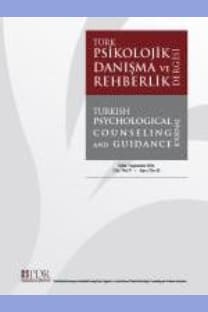Using a Hope-Centered model of career development in challenging times
Zor zamanlarda umut odaklı kariyer gelişimi modelinin kullanılması
___
- Alexander, E. S., & Onwuegbuzie, A. J. (2007). Academic procrastination and the role of hope as a coping strategy. Personality and Individual Differences, 42, 1301–1310.
- American Educational Research Association, American Psychological Association, & National Council on Measurement in Education. (1999). Standards for educational and psychological testing. Washington, DC: Author.
- Bandura, A. (2001). Social cognitive theory: An agentic perspective. Annual Review of Psychology, 52, 1–26. doi:10.1146/annurev psych.52.1.1
- Bowers, J., & Hatch, T. (2005). The ASCA national model: A framework for school counseling programs (2nd ed.). Alexandria, VA: American School Counselor Association.
- Ecevit, Y., Gunduz-Hosgor, A., & Tokluoglu, C. (2003). Professional women in computer programming occupations: The case of Turkey. Career Development International, 8(2), 78-87 doi:10.1108/13620430310465480
- Herr, E. L., Cramer, S. H., & Niles, S. G. (2004). Career guidance and counseling through the lifespan (6th ed.). Boston, MA: Allyn & Bacon.
- Holland, J. L., Daiger, D., & Power, P. G. (1980). My vocational situation: Description of an experimental diagnostic from for the selection of vocational assistance. Palo Alto, CA: Consulting Psychologists Press.
- Niles, S. G., Amundson, N. E. & Neault, R. A. (2010). Career flow: A hope-centered approach to career development. Boston, MA: Pearson Education.
- Niles, S. G., & Harris-Bowlsbey, J. G. (2009). Career development interventions in the 21st century (3rd ed.). Upper Saddle River, NJ: Prentice Hall.
- Niles, S. G., Yoon, H. J., & Amundson, N. E. (2010). Career flow index: Hope-centered career development competencies. Unpublished manuscript, University Park, PA.
- Snyder, C. R. (2002). Hope theory: Rainbows in the mind. Psychological Inquiry, 13, 249–275. doi:10.1207 S15327965PLI1304_01
- Snyder, C. R., Harris, C., Anderson, J. R., Holleran, S. A., Irving, L. M., Sigmon, S. T., Yoshinobu, L., et al. (1991). The will and the ways: Development and validation of an individual-differences measure of hope. Journal of Personality and Social Psychology, 60, 570–585. doi:10.1037/0022-3514.60.4.570
- Super, D.E. (1990). Career and life development. In D. Brown & L. Brooks (Eds.), Career choice and development: Applying contemporary theories to practice (2nd ed., pp. 197-261). San Francisco: Jossey- Bass.
- Yoon, H. J. (2009, June 30). The assessment of human agency: A helping tool for actualizing dreams. Presented at the National Career Development Association Global Conference, Washington, DC
- ISSN: 1302-1370
- Başlangıç: 1990
- Yayıncı: -
Saldırgan Davranışlarını Yordamada Çevresel Risk, Çevresel Güvenlik ve Okul İklimi Algısı
Evrim ÇETİNKAYA YILDIZ, Zeynep HATİPOĞLU SÜMER
Temel Empati Ölçeği Türkçe Uyarlaması:Geçerlik ve Güvenirlik Çalışması
Çiğdem Topçu, Özgür Erdur Baker, Yeşim Çapa-Aydın
Beliren Yetişkinlikte Romantik Yakınlığı Başlatma:Yakınlığa Karşı Yalıtılmışlık mı?
Uyumlu-Uyumsuz Mükemmeliyetçilik Ölçeği’nin Türkçe’ye Uyarlanması
Psi̇koloji̇k Danışman Adaylarının Yardım Etme Sti̇lleri̇
Yaşam Amaçlarının ve Psikolojik İhtiyaç Doyumunun Öznel İyi Oluş Üzerindeki Yordayıcı Rolü
Using a Hope-Centered model of career development in challenging times
G.Spencer NİLES, Joon.Hyung YOON, Elif BALIN, E.Norman AMUNDSON
Zor Zamanlarda Umut Odaklı Kariyer Gelişimi Modelinin Kullanılması
Spencer G. NİLES, Hyung Joon YOON, Elif BALIN, Norman A. AMUNDSON
